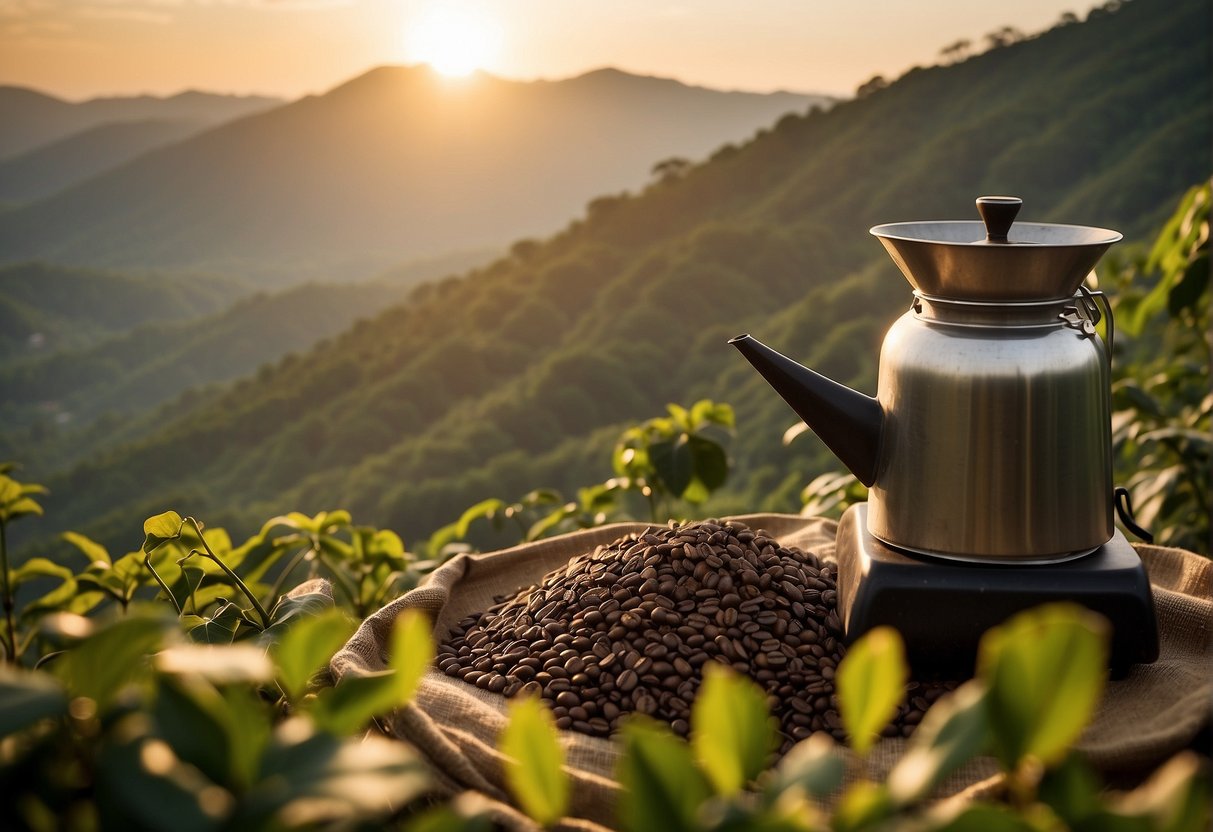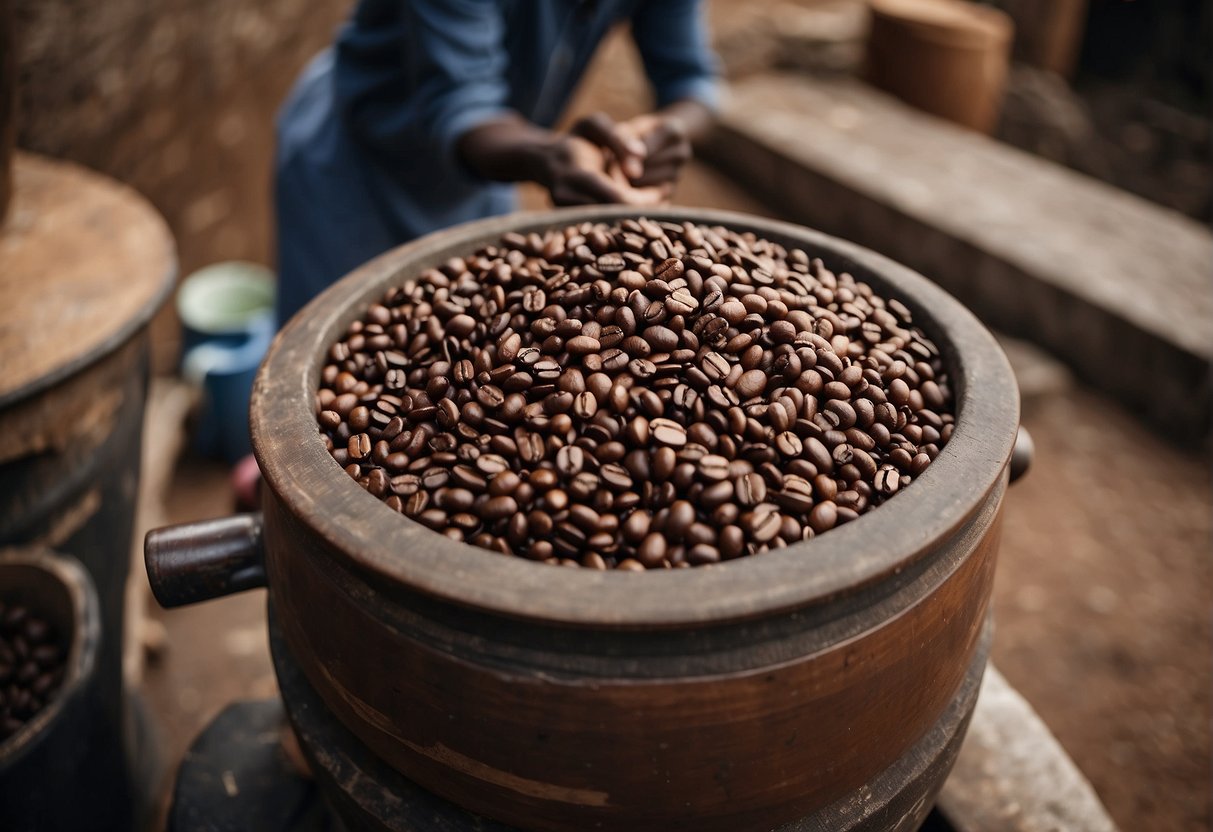Uganda is becoming a noteworthy player in the global coffee scene, with an increasing number of local coffee roasters who are determined to showcase the country’s unique coffee profiles. Situated in the lush landscapes of Eastern Africa, Uganda is blessed with a climate that is ideal for growing both Arabica and Robusta coffee beans, the two most popular species of coffee worldwide. While the country has been traditionally known for its Robusta production, there has been a significant upswing in the production of Arabica beans, contributing to a more diverse coffee cultivating landscape.

Local roasters in Uganda are leveraging the rich soil and varying altitudes to produce coffees with distinctive flavors that are starting to gain international recognition. These businesses are involving themselves not just in roasting but also in the meticulous processes of harvesting, processing, and packing to ensure quality. From the slopes of Mount Elgon to the regions of Kapchorwa and Masaka, these coffee varieties are carefully nurtured to develop their unique taste profiles that are both rich and complex.
As the coffee culture continues to grow, these Ugandan coffee roasters are crafting blends that appeal to a range of preferences, from vibrant and fruity to bold and earthy. Through their efforts, the world is becoming more acquainted with Ugandan coffee, establishing the country as a destination for coffee aficionados searching for exceptional and sustainably-sourced coffee experiences.
Overview of Ugandan Coffee
https://www.youtube.com/watch?v=L7qSerBZEf0&embed=true
Uganda’s coffee industry is renowned for its production of both robusta and arabica varieties. It is deeply ingrained in the country’s traditions and the economy, stretching across several regions with diverse climates.
History and Traditions
Coffee has a storied past in Uganda, where it’s been cultivated for generations. Traditions surrounding coffee are woven into the social and economic fabric of the nation. Historically, coffee was discovered in the Ethiopian region and made its way to Uganda, where the warm climate provided the perfect conditions for growing coffee cherries. In Uganda, coffee is not only a beverage but also a crucial aspect of cultural practices and local ceremonies.
Arabica and Robusta Varieties
Uganda is unique in growing both popular coffee species: arabica and robusta. Robusta coffee is indigenous to the country, often found growing naturally in the central and western regions. On the other hand, arabica coffee, which commands a higher price on the international market, is typically grown in the cooler, elevated areas like the slopes of Mt. Elgon. Arabica is known for its smooth, flavorful notes, while robusta has a stronger, more bitter profile.
Coffee Production Regions
Uganda’s coffee production is spread over several regions, each with its distinctive characteristics that influence the flavor profiles of the coffee:
- Central and Western: Predominantly robusta-producing areas, with coffee plants intercropped with traditional food crops.
- Mt. Elgon: This eastern region near the Kenyan border boasts high altitudes and volcanic soils, highly suitable for arabica coffee cultivation.
The country’s geography, with its rich soils and suitable altitudes, combined with the favorable equatorial climate, allows Uganda to produce coffee with a unique taste profile, marked by a rich body and fruity, floral notes.
Coffee Roasting Process

Transforming green coffee cherries into the aromatic brown beans enjoyed around the world is both an art and a science. Uganda’s coffee roasters use this process to unleash a variety of flavors from a single type of bean.
From Cherries to Beans
Before the actual roasting begins, coffee cherries must undergo processing to extract the green beans. The method used in Uganda typically involves either a dry process — where cherries are sun-dried and the fruit is later removed — or a wet process that ferments the cherries to remove the fruit and mucilage. Once dried, the green beans are sorted, often by hand, to ensure that only the best quality beans are sent to the roaster.
Roasting Levels and Flavor Profiles
Roasting is a delicate balance of time and temperature that transforms the green coffee beans into their roasted counterparts, unlocking the potential flavors they hold. The roast levels can vary from light to dark:
- Light Roast: Often used for more delicate flavors, these beans are light brown and have no oils on the surface.
- Medium Roast: Exhibiting a richer, darker color, these beans have a balanced flavor, aroma, and acidity.
- Dark Roast: These beans are dark brown, sometimes with an oily surface, and the flavors are bold and robust.
The roaster’s skill can heavily influence the flavor profiles that range from the bright acidity and fruitiness of a light roast to the full-bodied, often chocolaty notes of a dark roast. Ugandan roasters must pay close attention to the roasting process, adjusting time and temperatures to highlight the distinctive characteristics of each batch.
Profiles of Coffee Roasters in Uganda

In the vibrant coffee scene of Uganda, coffee roasters stand out for their quality and commitment to excellence. These profiles delve into the passion of local roasters, the vision of their founders, and the accolades that recognize their superior product.
Local Roaster Spotlights
-
Kyagalanyi Coffee: As a beacon in the Ugandan coffee industry, Kyagalanyi Coffee boasts a diverse range of services to thousands of Arabica farmers, producing coffee with a rich aroma and smooth taste that is recognized globally.
-
Ribbo Coffee: A proud product of Anyadwe Foods, Ribbo Coffee sources its beans from the Kapchorwa and Masaka regions, offering a 70% Arabica and 30% Robusta blend noted for its smooth, flavorful profile.
Founder Stories
-
Anneke Fermont: At the helm of Kyagalanyi Coffee, Anneke Fermont leads with a sustainable vision that not only elevates the brand but also supports a vast network of farming households, ensuring the production of quality coffee with a global impact.
-
Anyadwe Foods: The founders of Ribbo Coffee under Anyadwe Foods have curated a specialty blend that celebrates Ugandan coffee, focusing on a product that delivers a rich taste and aroma, appealing to connoisseurs across borders.
Awards and Recognition
Kyagalanyi Coffee: Known for excellence, this Ugandan coffee company has earned recognition for its significant contributions to the country’s specialty coffee sector, underpinning its status with a commitment to quality and sustainability.
Ribbo Coffee: Ribbo Coffee’s dedication to producing premium blends has not gone unnoticed, garnering accolades for its exceptional coffee that honors the rich coffee heritage of Uganda.
Sustainability and Ethical Practices
In Uganda, coffee roasters prioritize both the livelihoods of local farmers and the health of the environment. Their dedication is to produce delicious coffee while fostering social and ecological sustainability.
Supporting Local Farmers and Communities
Efforts by coffee roasters to support local farmers have led to fair compensation and initiatives for capacity building. For instance, Solidaridad’s program reaches thousands of coffee farmers in various districts, imparting training on inclusive practices and financial access. Such measures are critical in enhancing not only the farmers’ productivity and profitability but also their resilience against market fluctuations.
Environmental Impact and Sustainability Initiatives
Ugandan coffee roasters are actively implementing sustainability initiatives to lessen their environmental impact. This includes promoting eco-friendly farming practices, as documented by MTPAK Coffee, which ensures that the coffee production system remains sustainable for generations to come. Moreover, coffee is a crop sensitive to climate change, making the adoption of climate-smart practices a necessary step for the continuity and health of coffee farming in Uganda.
Processing, Retailing, and Enjoying Ugandan Coffee
Ugandan coffee undergoes meticulous processing and is widely available in retail spaces, offering a unique and satisfying experience to enthusiasts around the globe. Quality control ensures the delivery of high-quality beans while supermarkets and cafes make them easily accessible. Finally, brewing brings out the distinctive flavors that make Ugandan coffee a delightful treat.
Quality Control and Standards
In Uganda, strict quality control measures are in place to ensure that the coffee meets both national and international standards. The wet processing method is commonly used for Arabica beans, involving stages of pulping, fermentation, and washing. This is essential in enhancing the beans’ quality and smell, making them fit for exceptional cupping experiences. The Uganda Coffee Development Authority outlines criteria and guidelines that all coffee roasters and processors must follow to maintain these high standards.
Availability in Supermarkets and Cafes
Ugandan coffee can be found on shelves in both local and international supermarkets, usually as roasted beans or ground coffee. Cafes across Uganda take pride in serving coffee that is both high-quality and delicious, often sourced directly from local roasters and farmers. This level of accessibility makes it a great option for anyone looking to treat themselves to a rich, aromatic coffee experience. The presence of Ugandan coffee in supermarkets is a testament to its growing popularity and the efforts of dedicated coffee companies and field staff working within the country.
Brewing and Tasting Notes
When it comes to brewing Ugandan coffee, the process is vital in unlocking its full potential. A good cup of Ugandan coffee should exhibit a balance of acidity and body, often accompanied by flavors like citrus and berries for Arabica, with Robusta beans providing a bolder, earthier profile. Proper brewing methods, whether using a French press or a drip filter, can accentuate these notes, resulting in a cup that’s not only high-quality but also deeply satisfying. Enthusiasts and connoisseurs often note the unique and delicious layers of taste that Ugandan coffees possess, which can be explored further in resources like Coffee A to Z.
